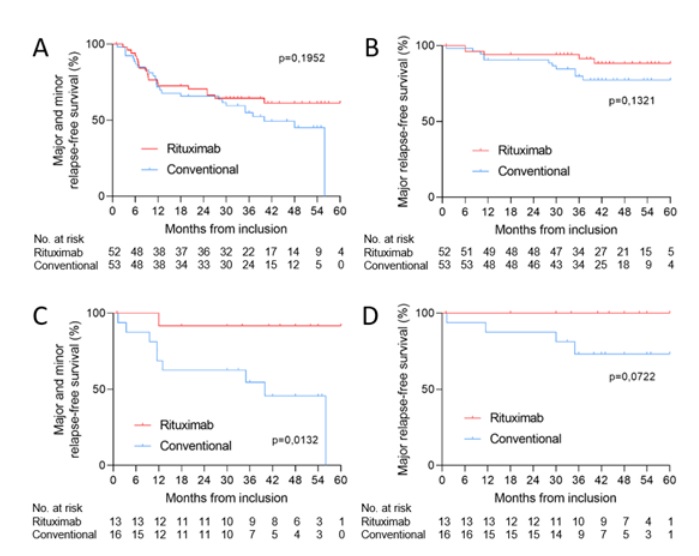Session Information
Session Type: Abstract Session
Session Time: 4:00PM-5:30PM
Background/Purpose: The Rituximab in Eosinophilic Granulomatosis With Polyangiitis (REOVAS) trial compared rituximab (RTX) infusions to conventional strategy for remission-induction in eosinophilic granulomatosis with polyangiitis (EGPA). This trial failed to show a superiority of RTX over the conventional strategy to induce remission at 180 days. However, the long-term efficacy and safety of RTX as compared with conventional strategy in EGPA remains unknown. We report here the long-term results of the REOVAS trial.
Methods: After completion of the 12-month REOVAS trial, patients were followed prospectively, with data on disease activity, medications and adverse events collected by the patients’ physicians every 6 months until the last follow-up. The primary endpoint was the minor and major relapse-free survival. Secondary endpoints were major relapses and asthma and ENT exacerbations were also assessed.
Results: Among 105 enrolled patients, only one was lost to follow-up. The median follow-up was 45 months (IQR 34-53).
At month 45 (median follow-up), for the RTX and conventional strategy arms, respectively, the minor and major relapse-free survival rates were 63.5% (95%CI 49.9%-75.2%) and 50.9% (95%CI 37.9%-63.9%) (p=0.24) ; major relapse-free survival rates were 90.4% (95%CI 79.4%-95.8%) and 79.2% (95%CI 66.5%-88.0%) (p=0.17); asthma and/or ENT exacerbation-free survival rates were 42.3% (95%CI 29.9%-55.8%) and 34.0% (95%CI 22.7%-47.4%) (p=0.42) ; and overall EGPA-related event-free survival rates were 32.7% (95%CI 21.5%-46.2%) and 22.6% (95%CI 13.5%-35.5%) (p=0.28). We then focused our analysis on patients with MPO-ANCA and showed that the minor and major relapse-free survival rates were 92.3% (95% CI 66.7% – 99.6%) and 50% (95% CI 58% – 72%) for the RTX and conventional arms, respectively (p=0.02).
As 39 patients were enrolled during follow-up in the double-blind MAINRITSEG trial evaluating RTX versus azathioprine for maintenance in EGPA, we focused our analysis on the 66 patients (63%) who were not enrolled in MAINRITSEG. At month 45, the minor and major relapse-free survival rates for the RTX (n=30) and conventional strategy (n=36) arms were 60.0% (95%CI 42.3%-75.4%) and 38.9% (95%CI 24.8%-55.2%), respectively (p=0.14), and the major relapse-free survival rates were 90.0% (95%CI 73.6%-97.3%) and 72.2% (95%CI 55.9%-84.3%), respectively (p=0.12). When analyzing only ANCA-positive patients (14 in the RTX and 14 in the conventional arms), the minor and major relapse-free survival rates were 78.6% (95%CI 51.7%-93.2%) and 35.7% (95%CI 16.2%-61.4%), respectively (p=0.054). Similar results were found when analyzing only MPO-ANCA positive patients (6 in the RTX and 9 in the conventional arms), showing that minor and major relapse-free survival rates were 100.0% (95%CI 55.7%-100.0%) and 22.22% (95%CI 5.3%-55.7%), respectively (p=0.007).
Conclusion: Among EGPA patients with active disease, long-term follow-up supports that RTX and the conventional strategy have similar efficacy in inducing and maintaining remission. However, in ANCA-positive patients, RTX was associated with a better relapse-free survival compared to the conventional strategy.
Patients were randomly assigned to receive remission induction therapy with rituximab strategy or conventional strategy, stratified according to disease-flare category, ANCA positivity and the Five Factor score
To cite this abstract in AMA style:
Dutertre M, Pugnet G, De Moreuil C, Bonnotte B, BENHAMOU Y, Chauveau D, Diot E, Duffau P, Limal N, Néel A, URBANSKI G, Jourde-Chiche N, MARTIN SILVA N, Maurier F, Mekinian A, Schleinitz N, ackermann F, Fauchais A, Froissart A, Le Gallou T, Uzunhan Y, Viallard J, Berezne A, chiche l, Crestani B, Direz G, DUREL C, Godmer P, Kahn J, Lambert M, de Menthon M, Quemeneur T, Cadranel J, Charles P, Dossier A, Guillevin L, Puéchal X, Terrier B. Long-term Efficacy of Remission-induction Regimens for Eosinophilic Granulomatosis with Polyangiitis [abstract]. Arthritis Rheumatol. 2023; 75 (suppl 9). https://acrabstracts.org/abstract/long-term-efficacy-of-remission-induction-regimens-for-eosinophilic-granulomatosis-with-polyangiitis/. Accessed .« Back to ACR Convergence 2023
ACR Meeting Abstracts - https://acrabstracts.org/abstract/long-term-efficacy-of-remission-induction-regimens-for-eosinophilic-granulomatosis-with-polyangiitis/



